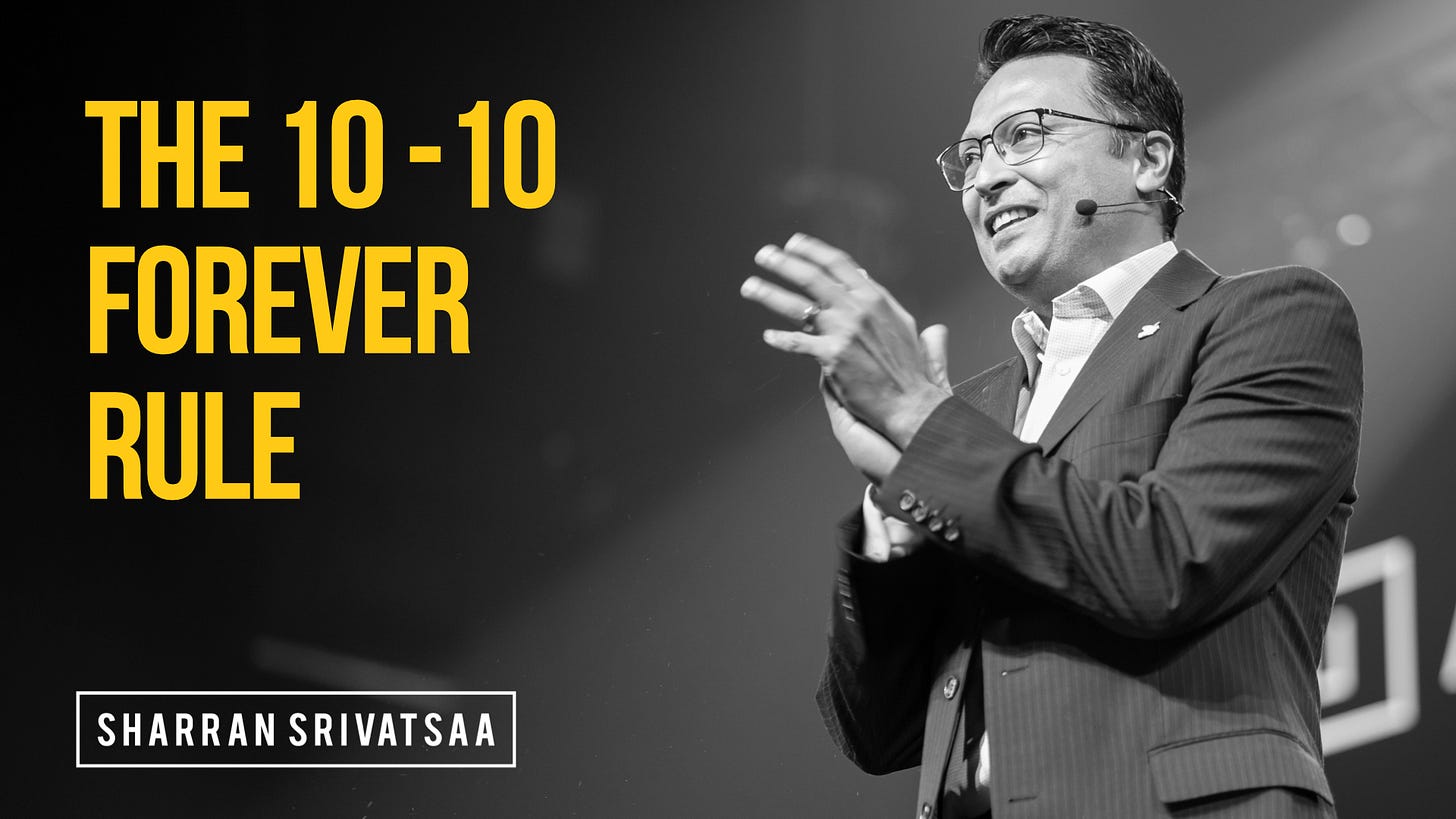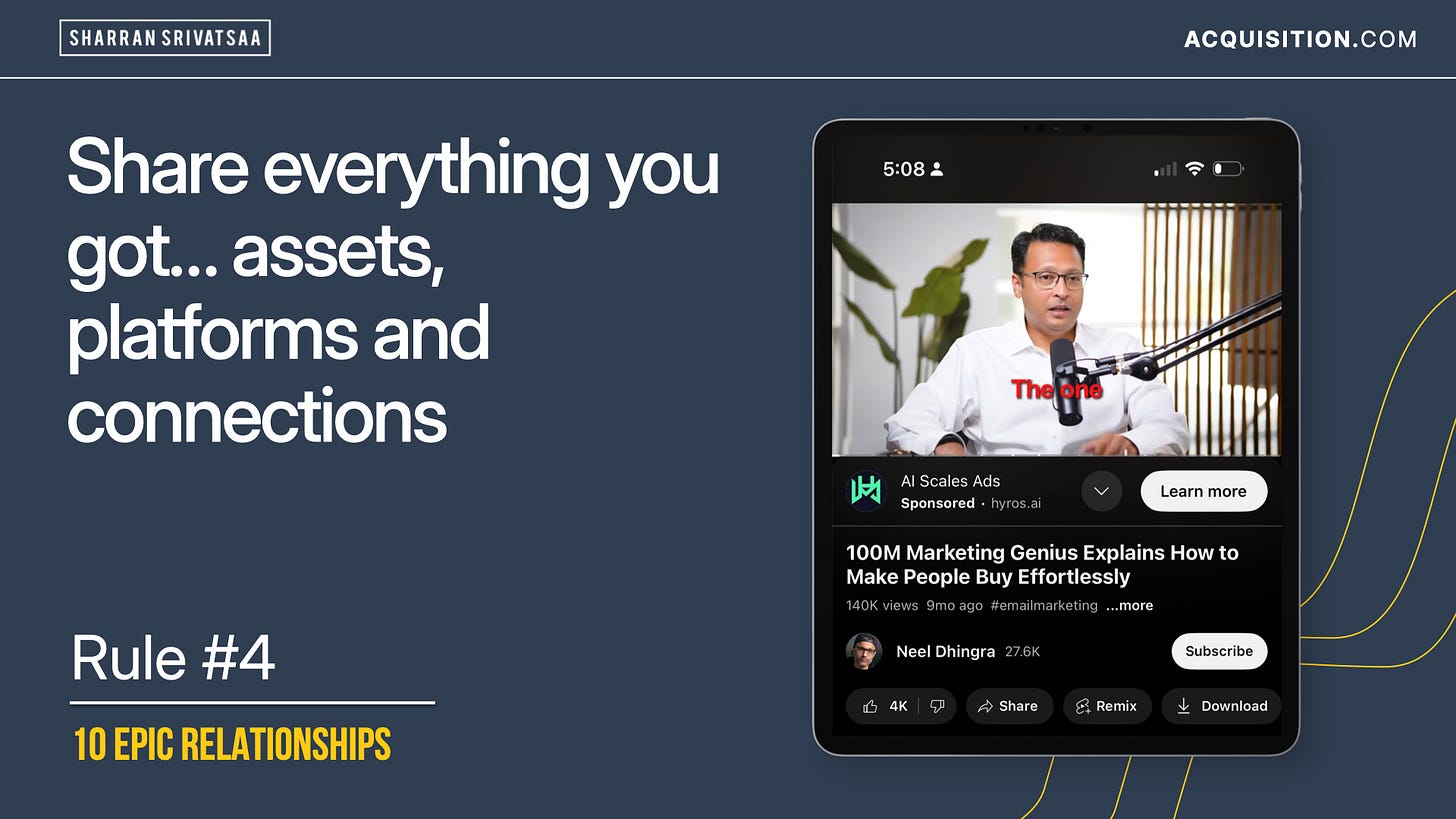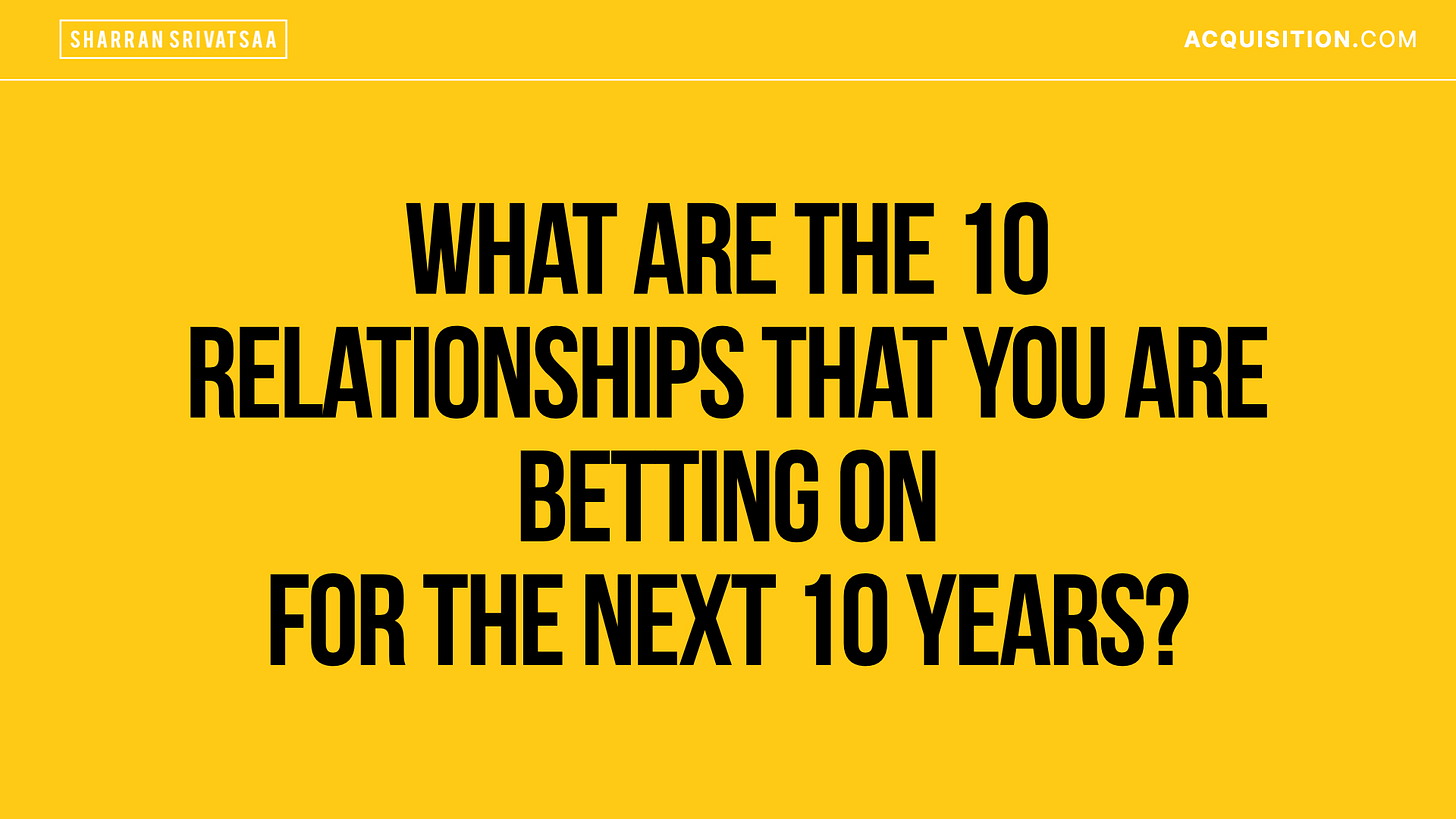The 10-10-Forever Rule [BDL #1]
The simple rule that has generated 99% of my net worth
I am not exaggerating when I tell you that this simple rule has been the core driver of 99% of my net worth so far.
And I am betting that it will continue to be the most important rule in my personal operating system going forward.
BTW, this is lesson #1 in the BDL series.
The Billion Dollar Lessons (BDL) series is where I share one timeless lesson at a time, each one organized into a clear framework, drawn from building two billion-dollar companies and investing in over 100+ businesses. This is what I wish I had when I didn’t have the playbook, and more importantly, what I hope my children will read one day. So I hope it helps you, and I hope it makes them proud.
People always say, “relationships are everything.”
But when you look closer, most relationships in business are surface-level.
A coffee.
A few emails.
A LinkedIn connection, if you are lucky.
And then… nothing. Poof.
The biggest outcomes in my life haven’t come from meeting more people.
They’ve come from going deep with a small group over a long period of time.
That’s where the 10–10–Forever Rule came from.
10 people.
10 years.
The kind of relationships that last forever.
1. Where This Rule Came From
The idea didn’t come from a book. Mostly because as an operator, it was hard to find time to read. It actually came from a realization that there was neither any joy nor any results in being a surface-level networking machine.
For years, I tried to “network.” I joined (paid) masterminds. I said yes to every meeting. I figured if I met enough people, eventually one would click.
False.
In fact, I noticed that most of those connections didn’t go anywhere. They were based on mutual convenience: I help you, you help me, and if it works out, great.
It felt transactional. Like keeping score.
That’s when I realized I hate transactional relationships.
I just hate keeping score.
It actually helped me understand myself more: I didn’t want balance. I didn’t want trades. I wanted to give so much that it changed the nature of the relationship for both of us.
So I made a rule. I’d invest in ten people. That’s it. And I’d give them my full attention. Not forever, but for at least ten years. That became the core idea.
Ten relationships. Ten years. And if it works, it becomes a partnership that lasts a lifetime.
2. You Can’t Do 200. You Can Definitely Do 10.
Ten is the number I can personally handle.
Not ten text threads. Ten real investments in people.
But not everyone qualifies to be in the circle of 10. That means you have to know what to look for.
Here is the framework I came up with for how I choose the 10.
First, can I actually help them?
I feel insecure in relationships where I can’t be useful. And when I feel insecure, I am not fun to be around. And If I can’t be useful — today, not someday — I figured that there’s no reason to put them in my circle of 10. I can be friendly. I can help when I can. But I can't go super deep with them.
Second, do we share the same values?
Without deep alignment here, it doesn’t matter how talented they are. It won’t work. Misaligned values always show up later. And often show up painfully and create a lot of relationship friction. Also, these are not just values like integrity, honesty, kindness, or character. I have actually found that people’s personal operating philosophy like responsiveness, preparedness, modes of communication, style of interaction, depth of vulnerability etc. were actually more crucial. For example: While this sounds trivial, it is very difficult to have a deep relationship with someone who likes to talk on the phone when you dislike the phone and prefer to text.
Third, is this person an undervalued stock?
I believe that I have not peaked yet. I believe that the best of “$Sharran Stock” is yet to come. You may find that cocky, however I subscribe to the idea of a bigger and better future. Which is why I also look for people who haven’t peaked yet. Builders who are still going. People who are hungry to grow. I see myself the same way. When two people like that partner up, good things tend to happen.
If all three are true, I lean in pretty hard.
And sometimes the timing is just off, which is okay too.
This is very important because I feel a sense of purpose to help them create a bigger and better future.
Not for a month. For ten years.
3. How I Show Up for My Ten
Once someone’s in my ten, I operate differently.
I take the approach of an investor. What if I was a VC and these 10 relationships were my only 10 portfolio companies. In fact, what if these 10 “portfolio companies” were going to make or break my career and my reputation. What would I do?
I’d do whatever it took, right?
With that in mind, I’ve developed five rules over the years. I don’t treat them like theory. I use them every day in my circle of 10.
Rule 1: The No Scorecard Rule
A friend called me a while back and asked for help. We got on the phone, and I gave him everything I could — strategy, structure, scripts, all of it.
At the end, he said, “Thank you so much. What can I do for you?”
And it ruined the moment.
He didn’t let the help land. He tried to even the score. Heck, he was probably just being polite and I totally understand that. But, it made it feel like a transaction. And I hate transactional relationships.
When I help someone I care about, I don’t want payback. I want progress. For both of us. I want to feel joy in seeing them win. I want to feel useful and enjoy feeling useful. And, I am sorry, I don’t have a running list of what someone can help me with… so that is such a dumb question to ask at the end of a phone call.
In my circle of 10, there are no “I owe you one” conversations.
There is no scorecard. I am all-in.
You can’t keep score in the relationships that matter.
Rule 2: Go overboard. Do epic shit.
People don’t remember the mundane stuff. They don’t remember the random lunch. Or how you went to happy hour. Or when you got extra-guac at chipotle.
They only remember the epic shit.
So, do epic stuff together.
These are real things I have done with my circle of 10.
We jumped out of a helicopter into the Panama Canal (smelled bad)
We surprised 3 “new” friends with a private jet trip to kickoff our relationship
I taught my best friend’s daughter how to drive a stick shift
We played a 3-day prank of one of my best friends, who in retrospect, claims it was one of the best times of his life. Let’s just say we put The Hangover to shame. Neither the tiger nor Mike Tyson came close.
Just to be clear: This is not for show. This is definitely not to be impressive. But because moments create momentum.
True Story:
My friend Neel Dhingra once asked me to speak at his mastermind. The timing didn’t work. I had to be back home the same day.
Instead of backing off, he figured it out.
Car to the airport. Helicopter to the event. Same thing in reverse.
It wasn’t the logistics that mattered. It was the thought. He cared enough to make it happen. And that changed our relationship. Forever.
People don’t forget when you make it easy to say yes.
Rule 3: Go Beyond Generosity
If someone I care about launches a book, I’ll buy it. And then I buy 1,000 copies. And then I try and get others to buy 1,000 copies and get him on the bestseller list.
If they’re raising money, I’ll invest.
If they have a new product launch, I buy it all. Including all the upsells. I go through the program… and leave a review.
If they’re starting something, I’ll promote it.
Not because they asked. Because I want to. That’s what investing in the relationship means. This is way beyond generosity. It is pure commitment to their success.
Even though this sounds reasonable, I will never forget this:
My mentor built an entire week for me in the Canadian outback, paid for the entire 5-star trip, and taught me lessons about life and business every morning at 4am by the fire. He transferred a decade of experiences to me in 5 days. That is beyond generosity.
Generosity isn’t just what you give. It’s when you give it.
If you wait to be asked, you’re already behind.
Rule 4: Share your platform
If you have something that can help — a podcast, a stage, a network — don’t hold back.
Put them on. Make the intro. Show up.
This one’s simple. If you believe in someone, act like it.
That’s how trust builds.
Rule 5: Say yes when they need you
Issy Sharp, the founder of Four Seasons, once told me:
“The answer is yes. Now what’s the question?”
That’s how I try to show up for my 10. If someone in my circle of 10 asks for anything… the answer is always yes, I find a way.
I mean…
You already made the decision to be in their corner.
You don’t need to re-decide every time they call.
The Big Idea Is This
Most people spread themselves thin. They chase every relationship and end up with none that really matter.
I’d rather go deep with ten people than stay shallow with two hundred.
This does not mean you don’t make friends outside of the 10 or you don’t help others. This definitely does not mean that the people that are not in your circle of 10 are unworthy of your time and care. Come on. Please don’t twist my words and be ridiculous. Being a good, kind and helpful human is the baseline. But you cannot go deep with everyone and this is my approach to having an implementable playbook to help others in a completely new way.
The 10–10–Forever Rule may not help you meet more people. But it will help you find the right ones. And once you do, it gives you a clear way to show up for them.
Not for a season. For the long haul.
That’s the best investment I’ve ever made.
And I am not exaggerating when I tell you that the 10-10-Forever rule has been the core driver of 99% of my net worth so far.







Hey Sharan. Quick question and genuinely asking, how can I get to be in the Top 10? 🙏🏻😊
Quite weird. Counterintuitive. Smart.